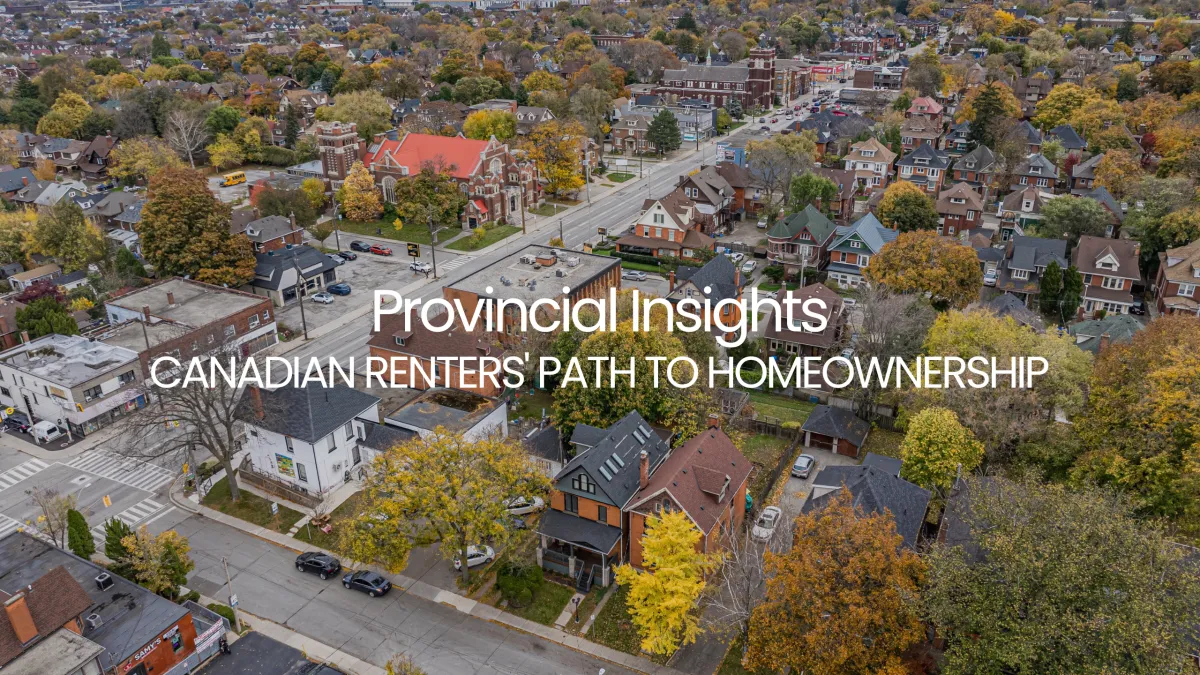
Canadian Renters' Path to Homeownership: Provincial Insights
Across Canada, more than one in four renters considered buying a home before signing their current lease. However, the journey to homeownership remains complex, with regional variations shaping renter behavior and affordability.
Ontario: Renters Watching for Market Shifts
In Ontario, 28% of renters reported considering buying a property before signing or renewing their lease.
Key barriers included:
43% waiting for home prices to decline
34% waiting for further interest rate cuts
34% unable to qualify for a mortgage or financing
Homeownership Outlook:
55% plan to buy a home in the future
15% plan to buy within 2 years
21% plan to buy within 2–5 years
31% do not plan to buy, citing:
Income constraints (50%)
Perceived affordability of renting (43%)
Reluctance to maintain a property (43%)
Rental Market Trends:
Toronto rents have softened:
1-bedroom average: $2,302 (-7.1% YoY)
2-bedroom average: $2,933 (-10.7% YoY)
Ottawa’s market is more stable:
1-bedroom average: $1,994 (flat YoY)
2-bedroom average: $2,559 (+2.4% YoY)
Affordability Pressure:
38% spend 31–50% of net income on rent
15% spend more than 50% on rent
39% are cutting grocery budgets to afford rent
Outlook:
More supply is expected in the short term, but developers are scaling back for future years. Renters currently have more negotiating power, but this may not last.

Quebec: Strong Aspirations, Strategic Waiting
In Quebec, 31% of renters considered buying before renewing their lease. Key reasons for renting:
37% waiting for home prices to drop
27% waiting for lower interest rates
27% renting to save for a down payment
Homeownership Outlook:
56% plan to buy a home
16% within 2 years, 23% within 2–5 years
32% do not plan to buy, due to:
Income constraints (50%)
Maintenance avoidance (41%)
Renting perceived as more affordable (35%)
Rental Market Trends:
Montreal rents are easing:
1-bedroom average: $1,727 (-2.0% YoY)
2-bedroom average: $2,255 (-2.6% YoY)
Affordability Pressure:
37% spend 31–50% of net income on rent
Only 8% spend more than 50% (lowest in Canada)
31% are cutting food budgets to afford rent
Outlook:
Quebec remains more affordable than other provinces. Homeownership remains a priority, but renters are pacing themselves, waiting for better conditions.

British Columbia: Renting to Save, Buying Remains a Goal
In British Columbia, 21% of renters considered buying before signing their lease.
Key factors for continuing to rent:
44% saving for a down payment
42% waiting for home prices to drop
26% unable to qualify for financing
Homeownership Outlook:
53% plan to buy a home
16% within 2 years, 19% within 2–5 years
26% do not plan to buy, primarily due to:
Income constraints (66%)
Renting perceived as more affordable (53%)
Reluctance to maintain a home (33%)
Rental Market Trends:
Vancouver rents are softening:
1-bedroom average: $2,544 (-4.8% YoY)
2-bedroom average: $3,358 (-7.4% YoY)
Affordability Pressure:
36% spend 31–50% of net income on rent
23% spend more than 50%
45% are cutting grocery budgets to afford rent
Outlook:
Vancouver’s rental market has reached a rare moment of balance, but price declines may have bottomed out. Renters are currently in a strong negotiating position.

Alberta: Canada’s Most Eager Potential Buyers
In Alberta, 34% of renters—the highest among provinces—considered buying before signing their lease.
Key barriers:
38% waiting for home prices to drop
28% unsure about employment stability
27% undecided on property type or location
Homeownership Outlook:
58% plan to buy a home
21% within 2 years, 23% within 2–5 years
29% do not plan to buy, citing:
Income constraints (49%)
Reluctance to maintain a property (35%)
Renting perceived as more affordable (27%)
Rental Market Trends:
Calgary rents are adjusting:
1-bedroom average: $1,591 (-8.2% YoY)
2-bedroom average: $1,944 (-9.2% YoY)
Edmonton rents are stabilizing:
1-bedroom average: $1,336 (-2.3% YoY)
2-bedroom average: $1,679 (-0.7% YoY)
Affordability Pressure:
35% spend 31–50% of net income on rent
18% spend more than 50%
50% are cutting grocery budgets to afford rent
Outlook:
Calgary’s rental market remains competitive, particularly for larger homes. Migration to Alberta continues to fuel demand.

Saskatchewan & Manitoba: Affordability Still Drawing Renters
In Saskatchewan and Manitoba, 28% of renters considered buying before signing their lease.
Key barriers:
53% renting to save for a down payment
48% waiting for prices to drop
38% unable to qualify for financing
Homeownership Outlook:
53% plan to buy a home
19% within 2 years, 21% within 2–5 years
36% do not plan to buy, citing:
Income constraints (56%)
Renting perceived as more affordable (49%)
Reluctance to maintain a property (34%)
Rental Market Trends:
Regina rents are rising:
1-bedroom average: $1,262 (+0.2% YoY)
2-bedroom average: $1,576 (+3.9% YoY)
Winnipeg rents are steady:
1-bedroom average: $1,443 (+1.9% YoY)
2-bedroom average: $1,762 (-0.2% YoY)
Affordability Pressure:
34% spend 31–50% of net income on rent
14% spend more than 50%
48% are cutting grocery budgets to afford rent
Outlook:
With new purpose-built rentals on the rise, rental inventory is expected to grow, though steady population increases will continue to support demand.

Atlantic Canada: Renters Facing the Greatest Strain
In Atlantic Canada, 16% of renters considered buying before signing their lease—the lowest rate nationally.
Homeownership Outlook:
45% plan to buy a home
9% within 2 years, 16% within 2–5 years
Rental Market Trends:
Halifax rents remain high:
1-bedroom average: $2,064 (+7.2% YoY)
2-bedroom average: $2,623 (+5.4% YoY)
Affordability Pressure:
27% spend 31–50% of net income on rent
31% spend more than 50% (highest in Canada)
53% are cutting grocery budgets to afford rent
Outlook:
Vacancy rates are improving, and tenants now have more selection. However, demand remains strong for central, affordable units. Many landlords are offering incentives to attract renters to larger or higher-end units.

Summary of Key Provincial Differences

About the Survey
Burson used the Leger Opinion online panel to survey 1,854 Canadian renters, aged 18+. A robust oversample was collected in Quebec (n=878) as well as in 9 major cities across Canada (Vancouver, Calgary, Edmonton, Winnipeg, Toronto, Ottawa-Gatineau, Sherbrooke, Quebec City, and Montreal). The survey was completed between June 2 and June 9, 2025. Weighting was applied to age, gender, regions, and cities based on 2021 census figures. No margin of error can be associated with a nonprobability sample (i.e., a web panel in this case). For comparative purposes, a probability sample of 1,854 respondents would have a margin of error of ±2%, 19 times out of 20.
About Royal LePage
Serving Canadians since 1913, Royal LePage is the country’s leading provider of services to real estate brokerages, with a network of approximately 20,000 real estate professionals in over 670 locations nationwide. Royal LePage is the only Canadian real estate company to have its own charitable foundation, the Royal LePage® Shelter Foundation™, which has been dedicated to supporting women’s shelters and domestic violence prevention programs for 25 years. Royal LePage is a Bridgemarq Real Estate Services® Inc. company, a TSX-listed corporation trading under the symbol TSX:BRE. For more information, please visit www.royallepage.ca.
Royal LePage® is a registered trademark of Royal Bank of Canada and is used under licence by Bridgemarq Real Estate Services® Inc.
[1]Burson used the Leger Opinion online panel to survey 1,854 Canadian renters, aged 18+. A robust oversample was collected in Quebec (n=878) as well as in 9 major cities across Canada (Vancouver, Calgary, Edmonton, Winnipeg, Toronto, Ottawa-Gatineau, Sherbrooke, Quebec City, and Montreal) The survey was completed between June 2 and June 9, 2025. Weighting was applied to age, gender, regions, and cities based on 2021 census figures. No margin of error can be associated with a nonprobability sample (i.e., a web panel in this case). For comparative purposes, a probability sample of 1,854 respondents would have a margin of error of ±2%, 19 times out of 20.
[2] June 2025 Rentals.ca Rent Report, Rentals.ca Network data and Urbanation Inc., June 2025. The data used in the National Rent Report analysis is based on monthly listings from the Rentals.ca Network of Internet Listings Services (ILS). The Rentals.ca Network of ILS’s data covers both the primary and secondary rental markets and includes basement apartments, rental apartments, condominium apartments, townhouses, semi-detached houses, and single-detached houses. Properties listed for greater than $5,000 per month, and less than $500 per month are removed from the sample. Similarly, short-term rentals, single-room rentals, and furnished suites are removed from the sample when identifiable.


Royal Lepage Signature Realty
(647) 492-1880
495 Wellington St. W. #100 Toronto, ON M5V 1E9
Copyright 2024 Q Real Estate Group - All rights reserved. Toronto Regional Real Estate Board (TRREB) assumes no responsibility for the accuracy of any information shown. The information provided herein must only be used by consumers that have a bona fide interest in the purchase, sale or lease of real estate and may not be used for any commercial purpose or any other purpose.
Privacy Policy | Cookie Policy | Property Listings | Sitemap | Accessibility
The data relating to real estate on this web site comes in part from the Internet Data Exchange (IDX) program of the Toronto Real Estate Board. The information herein is believed to be accurate and timely, but no warranty as such is expressed or implied. The information provided herein must only be used by consumers that have a bona fide interest in the purchase, sale, or lease of real estate and may not be used for any commercial purpose or any other purpose. IDX information is provided exclusively for consumers’ personal, non-commercial use and that it may not be used for any purpose other than to identify prospective properties consumers may be interested in purchasing. Information deemed reliable but not guaranteed to be accurate. Listing information updated daily.
